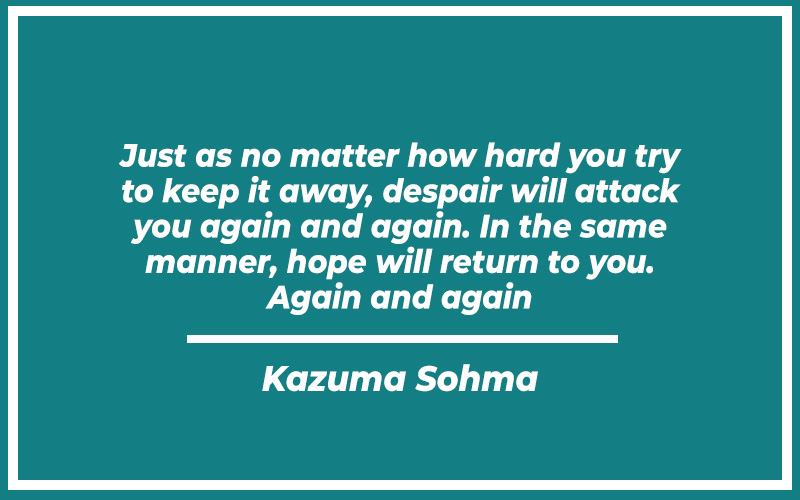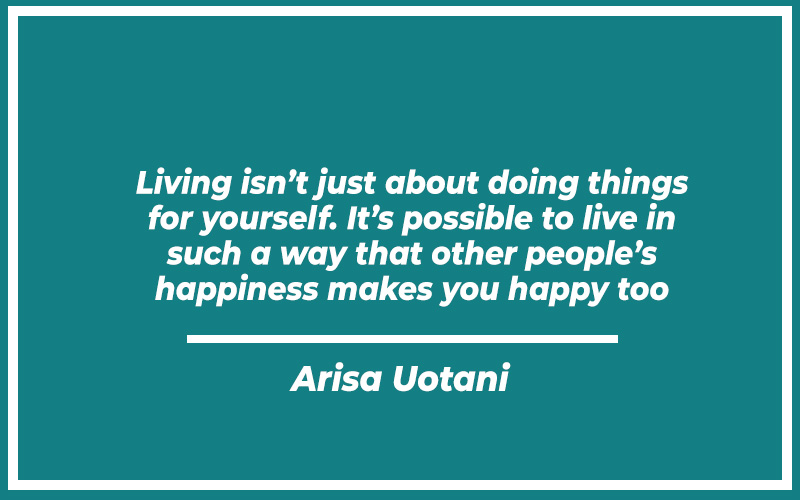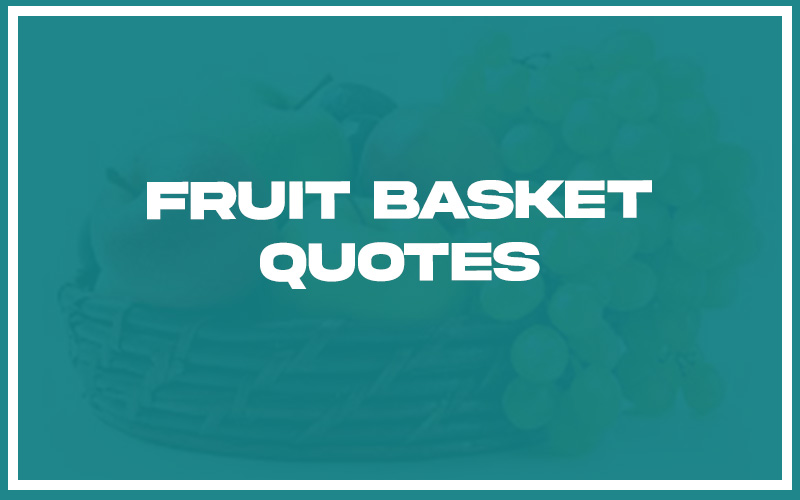If you’re someone who loves diving into stories rich with emotion and growth, then the quotes from “Fruits Basket” are sure to resonate with you.
This beloved manga and anime series offers more than just an engaging plot; it provides a deep exploration of love, loss, acceptance, and healing.
As you explore the world of “Fruits Basket,” you’ll find that its quotes capture the essence of the characters’ struggles and triumphs, making them relatable and inspiring. Each line encourages you to reflect on your own experiences and the lessons learned along the way.
Best Fruit Basket Quotes

“Just as no matter how hard you try to keep it away, despair will attack you again and again. In the same manner, hope will return to you. Again and again.” – Kazuma Sohma
Kazuma Sohma’s words resonate with the perennial struggle between despair and hope. He highlights that just as despair is relentless, so is hope’s capacity to reemerge and inspire resilience.
This quote is a reminder of the cyclical nature of human emotions and the enduring promise of better moments despite ongoing challenges.
Also Read: Trent Shelton Quotes (with Explanation)
“If it’s possible for one person to be hurt by another, then it’s possible for that same person to be healed by another.” – Hatori Sohma
Hatori Souma emphasizes the dual potential in human interactions—harm and healing. He suggests that the same closeness which can cause emotional pain also holds the capacity to mend it, stressing the healing power of compassionate, supportive relationships.
This perspective encourages viewing personal connections as sources of potential recovery and emotional replenishment.
“Caring for someone isn’t based on logic. You can’t really rationalize emotions.” – Kagura Souma
Kagura Souma articulates the inherent illogical nature of emotions and caring, which often escape rational understanding.
By acknowledging that emotions are not governed by logic, this quote invites acceptance of emotional responses as genuine and significant, urging individuals to value and trust their feelings and the feelings of others without seeking logical justification.
“People around the world are like onigiri. Everyone has an umeboshi with a different shape and color and flavor.” – Tooru Honda
Tooru Honda uses a simple yet profound analogy of onigiri to illustrate human diversity. She suggests that everyone has something unique and essential at their core, which defines them just as umeboshi (a sour plum) defines onigiri.
This quote celebrates individuality and encourages appreciation of each person’s distinctive qualities and contributions.
“Sometimes living can be hard! But it’s only because we’re alive that we can make each other laugh, cry, and be happy!” – Tohru Honda
Tohru Honda reflects on the inherent difficulties of life, linking them to the emotional richness that defines human experience. She asserts that the ability to feel and share emotions like laughter, tears, and joy is not just a part of life but a testament to being alive.
This quote champions the emotional connections that bring depth and meaning to our existence.
“We’re all born with selfish desires so we can relate to those feelings in others. But kindness is created individually by each person…” – Kyouko Honda
Kyouko Honda speaks to the universal condition of selfishness, positioning it as a common ground that helps us understand each other. However, she contrasts this with kindness, which she sees as a personal achievement formed through deliberate choices and actions.
This quote underscores the notion that while some traits are innate, others, like kindness, are cultivated and refined through personal effort and integrity.
“I think when someone accepts you, for the first time… you feel like you can… forgive yourself a little. You can begin to face your fears… with courage.” – Yuki Souma
Yuki Souma discusses the profound impact of acceptance on self-perception. He suggests that being accepted by others can lead to self-acceptance, which in turn fosters courage and the ability to confront personal challenges.
This quote highlights the transformative power of acceptance and understanding, suggesting that it can catalyze personal growth and resilience.
“Even I… know what it’s like to be jealous.” – Shigure Sohma
Shigure Sohma’s confession sheds light on the universal experience of jealousy, a raw and often uncomfortable emotion. By admitting his own susceptibility to jealousy, Shigure humanizes himself and reminds us that such feelings are a common part of the human condition.
This quote opens a discussion on the importance of acknowledging and dealing with our emotions constructively, rather than denying them, which can lead to deeper self-awareness and emotional growth.
“To truly love someone, is to always put their feelings before your own… no matter what.” – Saki Hanajima
Saki Hanajima speaks to the essence of selfless love, emphasizing the importance of prioritizing another’s emotional well-being. This perspective on love challenges individuals to consider the depth of their affections and the sacrifices they are willing to make.
It reflects a mature view of love that transcends mere affection or attraction, suggesting that true love involves a continual commitment to another’s happiness, even at personal costs.
“A sixth sense cannot make up for a total lack of common sense.” – Saki Hanajima
This quote by Saki Hanajima humorously points out that intuition or special sensitivity, which she is known for, cannot replace basic common sense. It’s a reminder that while unique abilities or insights can be valuable, they should not lead us to overlook simple, practical wisdom.
This balance is essential for making sound decisions in life, highlighting that both intuitive and rational thinking have their places.
“We’ve just witnessed a classic example of what I like to call ‘misdirected rage’. Though I believe the technical term is being an ass.” – Shigure Sohma
Shigure Sohma comments on the phenomenon of misdirected anger with his typical wit, offering a critical yet humorous observation of human behavior. This quote invites reflection on how people often displace their frustrations onto inappropriate targets, rather than addressing the real sources of their anger.
It serves as a cautionary tale about the importance of self-awareness and proper emotional management.
“The scariest and the most painful thing is to be hated by someone you truly love.” – Tohru Honda
Tohru Honda expresses a deep fear of rejection, especially from loved ones, capturing the intense pain associated with interpersonal conflicts. This quote underscores the vulnerability that comes with deep emotional connections and the profound impact that love and hate can have on one’s psyche.
It is a poignant reminder of the stakes involved in intimate relationships and the emotional risks they entail.
“There are things that take a long time to acquire. Friends. Love. Really, nothing has been a waste.” – Megumi Hanajima
Megumi Hanajima reflects on the slow and often challenging process of building meaningful relationships and personal achievements. This quote encourages patience and persistence, suggesting that the time and effort invested in developing deep connections and pursuing passions are never in vain.
It is a positive affirmation that values endurance and the gradual nature of personal growth and relationship building.
“I don’t think anyone is born knowing the reason why they’re here. It’s just something you have to find as you go along.” – Honda Tohru
Honda Tohru addresses the existential quest for purpose, emphasizing that understanding one’s life mission is not innate but a discovery made through living.
This quote reassures those feeling uncertain about their path, promoting a view of life as a journey of continual exploration and self-discovery. It encourages embracing the unknown and finding meaning in the experiences and choices we encounter along the way.
“When you get anxious about the future, it is better not to think about it. The more you think about it the more anxious you’ll get.” – Shigure Sohma
Shigure Sohma’s advice speaks to the heart of anxiety management. This quote encourages a focus on the present moment as a strategy to mitigate worries about the future.
It underscores the idea that dwelling on uncertainties or potential negative outcomes only fuels anxiety, rather than resolving it. Instead, concentrating on the immediate actions and thoughts can alleviate stress and promote a healthier mindset.
“I don’t think anyone is born knowing the reason why they’re here. It’s just something you have to find as you go along.” – Tohru Honda
Tohru Honda’s reflection on life’s purpose highlights that understanding our place in the world isn’t innate but is discovered through lived experiences. This quote reassures those searching for meaning that it is normal to feel uncertain and that clarity often emerges through engaging with life’s various challenges and opportunities.
It encourages an exploratory approach to life, suggesting that finding one’s purpose is a personal and evolving journey.
“You can erase my memory, but afterwards, promise you’ll still be my friend?” – Tohru Honda
Tohru Honda’s poignant request underscores the value of enduring friendships that surpass even the deepest trials. This quote delves into themes of identity, memory, and relational permanence, suggesting that true friendship is rooted in something deeper than shared experiences.
It is about an emotional connection that persists despite external changes. It captures the essence of loyalty and the profound desire for continuity in relationships.
“Maybe I wanted… to be NEEDED… By something… That wouldn’t exist without me.” – Yuki Sohma
Yuki Sohma expresses a universal longing to feel indispensable, to fulfill a role that only one can serve. This quote taps into the deep-seated human desire for purpose and significance within a community or relationship.
It highlights the emotional satisfaction and self-esteem that come from being necessary to someone or something, a powerful driver of personal motivation and self-worth.
“It’s not like I suddenly became stronger, nor did anything change. My body still trembles, but I’ll keep facing my fears.” – Yuki Sohma
Yuki Sohma articulates a raw and realistic portrayal of courage. His words reveal that true bravery isn’t about the absence of fear but the determination to confront it.
This quote offers a nuanced understanding of personal growth, emphasizing that progress often involves continual effort and facing challenges head-on, despite ongoing doubts or fears.
“It’s all very simple. But maybe because it’s so simple, it’s also hard.” – Natsuki Takaya
This philosophical musing by Natsuki Takaya reflects on the paradox that simplicity often entails complexity. The quote suggests that straightforward concepts or actions can be the most challenging to implement or accept, due to their profound implications or the discipline they require.
It invites contemplation on how simplicity in thought and action requires not only understanding but also significant mental and emotional clarity.
“I’m different. I have a “special existence.” I have been given an “eternal promise.” And everyone is waiting for me. So, I’m wanted. Because… that’s what father said.” – Akito Sohma
Akito Sohma’s introspection into his sense of self and destiny encapsulates the weight of familial expectations and the search for identity. This quote explores the influence of external validations and predetermined roles on personal identity.
It critically assesses the concept of “special existence” as both empowering and burdensome, highlighting the complex interplay between individual aspirations and inherited responsibilities.
“To truly love someone, is to always put their feelings before your own… no matter what.” – Saki Hanajima
Saki Hanajima defines love as a selfless act where one prioritizes the feelings and needs of others above their own. This quote champions the virtues of empathy and sacrifice, which are integral to deep, meaningful relationships.
It highlights the altruistic nature of love that goes beyond personal desires, advocating for a love that nurtures and supports, even at one’s own expense. This approach to relationships calls for profound commitment and understanding, reflecting the depth of connection that love can foster.
“The scariest and the most painful thing is to be hated by someone you truly love.” – Tohru Honda
Tohru Honda articulates a profound fear that resonates with anyone who has experienced unrequited love or rejection. This quote delves into the vulnerability that comes with deep affection, where the disapproval or disdain of a loved one can feel devastating.
It speaks to the core of human relational dynamics, emphasizing how closely tied our emotional well-being is to the perceptions and feelings of those we care about most.
“It’s not always easy to see the good in people. In some people, you might even doubt that it’s there at all. But if you can somehow, find a way to believe…sometimes that’s all it takes to help someone, to give them the strength to find the good in themselves.” – Tohru Honda
Tohru Honda highlights the power of positive perception and belief in others. This quote encourages seeing beyond surface flaws or behaviors to acknowledge the potential goodness within everyone.
It suggests that our faith in others can act as a catalyst for their personal growth and self-improvement, underscoring the impact of encouragement and positive reinforcement in interpersonal relationships.
“Even if we forget the faces of our friends, we will never forget the bonds that were carved into our souls.” – Oshima
Oshima reflects on the enduring nature of deep emotional connections, suggesting that even if memories fade, the essence of significant relationships remains.
This quote speaks to the indelible impact of true friendship and the lasting imprint it leaves on us, transcending ordinary memory and continuing to influence us at a fundamental level.
“There’s just something about walking under a sunny sky that makes you feel like you’re flying.” – Kyo Sohma
Kyo Sohma captures the uplifting sensation of a carefree moment under the sun, where the simple act of walking can feel liberating. This quote reflects the joy found in life’s small pleasures and the ability of nature to elevate our spirits.
It encourages appreciation for the present moment and the simple beauties that surround us.
“No one really starts out kind. All we know how to do at first is want. We want food, we want attention… It’s not until someone cares for us with kindness that we become kind.” – Tohru Honda
Tohru Honda discusses the learned nature of kindness, positing that it is not an innate trait but one cultivated through experience and nurture. This quote emphasizes the transformative power of receiving kindness from others, which in turn teaches us to extend it outward.
It challenges us to be agents of kindness, shaping the social fabric through our actions and interactions.

“Living isn’t just about doing things for yourself. It’s possible to live in such a way that other people’s happiness makes you happy too.” – Arisa Uotani
Arisa Uotani offers a perspective on altruistic living, suggesting that personal fulfillment can be deeply connected to the happiness of others. This quote promotes the idea of communal happiness and shared experiences as sources of personal joy.
It advocates for a selfless approach to life, where one finds satisfaction in contributing to the well-being of others, thereby creating a more fulfilling and interconnected existence.
Also Read: Gabor Mate Quotes (with Explanation)
Final Thoughts
“Fruits Basket” isn’t just a story about a family under a curse; it’s a journey through the complexities of the human heart. As you ponder the impactful quotes from the series, let them remind you that everyone carries burdens, but also the capacity for change and growth.
Remember, like the characters in “Fruits Basket,” you too can overcome adversity, learn to forgive, and move forward with hope.
These quotes can serve as gentle reminders to embrace your journey, with all its challenges and opportunities for transformation.

